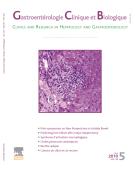Upper gastrointestinal bleeding: What has changed during the last 20 years? - 23/10/08
 , M. Schapira, J.-M. Ghilain, J.-M. Maisin, S. De maeght, P. Deltenre, M. Moulart, T. Delaunoit
, M. Schapira, J.-M. Ghilain, J.-M. Maisin, S. De maeght, P. Deltenre, M. Moulart, T. DelaunoitSummary |
Aim of the study |
The purpose of this study was to assess the clinical, epidemiological, therapeutic and prognostic changes observed in patients with upper gastrointestinal bleeding (UGIB) during the last two decades.
Methods |
Two cohorts of 200 patients with UGIB consecutively recruited during the period 1984–1987 (cohort A) then during the period 2004-2006 (cohort B) were compared.
Results |
Median age was 61.5 years in the cohort A and 67 years in the cohort B. The main etiologies remained variceal bleeding and peptic ulcer, but esophagitis and Mallory-Weiss syndrome were more frequently observed recently. The intake of gastrotoxic drugs did not decreased despite the widely acknowledged harmful effects of these drugs. Regarding management practices, a therapeutic intervention during the first endoscopy was performed in 36% of the cases in the cohort B but only in 2% of the cases 20 years ago. The frequency and the volume of blood transfusion dramatically decreased during the last two decades. Regarding the outcome, the requirement for surgery and the rate of recurrent bleeding decreased by half, but mortality remained unchanged.
Conclusion |
The main changes observed in patients admitted for UGIB 20 years apart concerned epidemiological features, treatment and prognosis.
Il testo completo di questo articolo è disponibile in PDF.Résumé |
Objectif |
Le but de cette étude a été d’analyser les changements observés dans la clinique, l’épidémiologie, le traitement et le pronostic de l’hémorragie digestive haute durant les 20 dernières années.
Méthodes |
Deux cohortes de 200 malades admis consécutivement pour hémorragie digestive haute, l’une colligée durant les années 1984–87 (Cohorte A) et l’autre durant les années 2004-2006, ont été comparées.
Résultats |
- L’âge médian était de 61,5 ans dans la cohorte A et 67 ans dans la cohorte B. Les étiologies principales sont restées la rupture de varices œsophagiennes et l’ulcère peptique, mais l’œsophagite et le syndrome de Mallory-Weiss sont des causes émergentes. La prise de substances gastrotoxiques n’a pas diminué malgré la dangerosité bien connue de ces médicaments. Concernant la prise en charge, un geste thérapeutique durant l’endoscopie initiale est réalisé aujourd’hui dans 36 % des cas alors qu’il ne l’était que dans 2 % des cas il y a 20 ans. La fréquence et le volume des transfusions de sang ont nettement diminué durant les deux dernières décennies. Concernant le pronostic, la nécessité d’opérer et le taux de récidive hémorragique ont chuté de moitié. En revanche, la mortalité reste stable.
Conclusion |
les principaux changements observés dans l’hémorragie digestive haute concernent l’épidémiologie, le traitement et le pronostic.
Il testo completo di questo articolo è disponibile in PDF.Mappa
Vol 32 - N° 10
P. 839-847 - Ottobre 2008 Ritorno al numeroBenvenuto su EM|consulte, il riferimento dei professionisti della salute.

